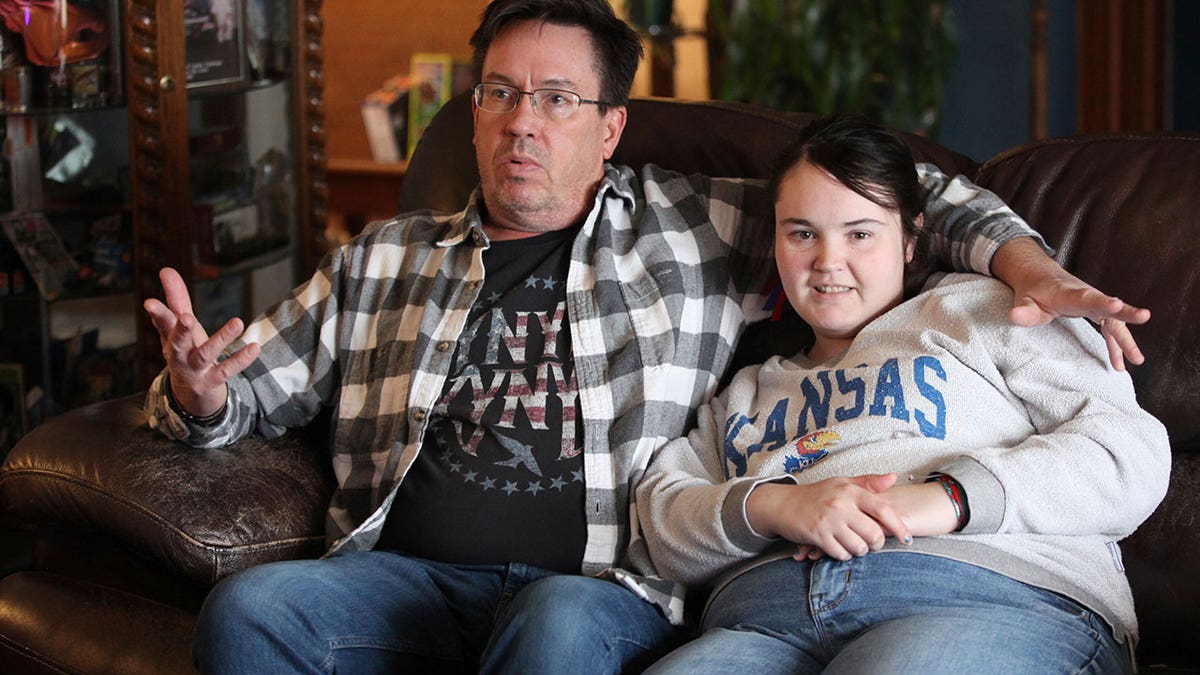Georgia family adopts paralyzed sea turtle for daughter with similar disability
Kendall Barfield, 12, and her mother, Danielle Barfield, tell the story of how they met their adopted green sea turtle at the Georgia Sea Turtle Center.
- Hundreds of thousands of children with disabilities are on waiting lists for state-covered services across the U.S.
- These services include day programs, employment assistance and home care, aimed at fostering independence and building work skills.
- Federal law doesn't mandate states to provide home and community-based services, leading to variations in coverage across states.
When Lilly Miller was in elementary school, teachers told her parents they needed to immediately sign up their youngest daughter, who has Down syndrome, for a wait list so the state would pay for a day program when she grew up. The teachers predicted a six-year wait.
The Millers have been waiting 10 years. Lilly is now 21 and has aged out of special education programs in the public schools in their hometown of Wichita, Kansas. Her parents, also teachers, have hired a home caregiver. A day program, where she would learn new job skills or flex existing ones while socializing, would cost between $1,500 and $2,000 a month, Marvin Miller said.
Across the U.S., hundreds of thousands of children, adolescents and young adults with physical or intellectual disabilities are waiting for state-covered services. In Kansas, legislative committees planned Wednesday to consider proposals for higher funding. But even with more funds, it could take years to eliminate the state's waiting lists.
The services, which include day programs, employment assistance, and home care, are designed to foster independence and build work skills. Without them, Marvin Miller said, his youngest daughter isn't getting enough social interaction. "We've actually seen her regress."

Rick Elskamp sits with his oldest daughter, Sheridan, and discusses the frustrations of having his 23-year-old daughter on a lengthy waiting list for services as an intellectually disabled adult, on Jan. 27, 2024, at the Elskamps' home outside Topeka, Kan. Thousands of Kansas residents with disabilities and hundreds of thousands across the U.S. are on waiting lists for services. (AP Photo/John Hanna)
"Someday, I won’t be around anymore, and that’s a parent’s greatest fear," Miller said during an interview. "I want her to be at the place where, if something should happen in 15 years when I’m gone, she will still have a community of supports and friends and all the things that we take for granted when we work in jobs and and have neighbors."
Parents across the U.S. have been stalled getting services for toddlers who are delayed developmentally. But many parents of children with intellectual or physical disabilities also must think years into the future.
KANSAS IS POISED TO EXPAND TAX CREDIT FOR HELPING DISABLED WORKERS AFTER DEBATE OVER LOW PAY
At least 692,000 people with physical or intellectual disabilities are waiting for services in at least 40 states, according to a November 2023 survey by KFF, a health policy research group. Federal law doesn’t require states to provide home and community based services, and what they cover varies.
Kansas expects to spend $776 million under its current budget on such services for the disabled. That funding would have to jump by roughly 54% to about $1.2 billion annually to eliminate waiting lists.
But Kansas also has seen its budget surpluses balloon since mid-2020 and they're now projected to approach $4.5 billion by the end of June. Democratic Gov. Laura Kelly and the Republican-controlled Legislature both advocate big tax cuts, although they haven't been able to agree on the details.
Neil Romano, a National Council on Disability member, said it's "simply responsible" to help families so parents can be more productive in their jobs or attend to more family needs — even take weekend breaks.
"You’re not just providing help for that family and that child," he said. "You’re providing help for the community."
Kansas has separate in-home and community services programs for physically and developmentally disabled residents, together serving about 15,000 people. As of mid-February, the two waiting lists totaled about 7,500 people. That figure has grown 37% over the past five years, even with increases in funding.
Outside Topeka, Rick and Anna Elskamp's oldest daughter Sheridan is now 23, and the family recently received word in December that she was off the waiting list for intellectually disabled Kansas residents — after 10 years. A month later, after more administrative hoops, they said, they were still paying for day services themselves.
They said navigating the state's social services system has been time-consuming and, Rick Elskamp said, "All their acronyms and abbreviations are a whole new language."
The budget committee in the Republican-controlled Kansas Senate was set Wednesday to consider a proposal from the Democratic governor for an additional $23 million to shrink the state's waiting lists by a total of 500 people.
When Kelly outlined her proposal earlier this month — weeks after presenting a proposed $25.6 billion budget without it — Republicans in the GOP-controlled House already had been working on a plan twice as large. That plan was on the House budget committee's agenda Wednesday.
But disability rights advocates want lawmakers to be even more aggressive, particularly in attacking the more persistent and larger waiting list for people with intellectual disabilities. They'd like to spend roughly $85 million more in the next budget, reduce both lists by a total of 1,600 people and eliminate both lists in five years.
Instead of shrinking the waiting list for people with intellectual disabilities by 250 or 500, their plan would reduce it by 1,100 people.
"Very typically, 300 to 400 people can be added to the waiting list in any one year," said Rocky Nichols, executive director of the Disability Rights Center of Kansas, a former legislator. "So 500 slots may not reduce the waiting list much at all."
Oklahoma struggled for years to provide services to residents with intellectual disabilities and had 5,100 people on a waiting list, with some families waiting up to 13 years. With state revenue collections at record highs in 2022, lawmakers increased provider rates by 25% — and poured extra money into covering more people. It hopes to provide services to everyone who was on that list as of this spring.
Kansas lawmakers approved an additional $283 million over the past five years on home and community-based services — but 90% of it went to increasing rates paid to providers, according to legislative researchers.
Officials said the state needed first to build up its network of providers and make sure they could attract enough workers.
"It is very difficult to solve the waiting list problem without also addressing the workforce problem," said Alice Burns, associated director of KFF's program on the medically uninsured and state Medicaid programs.
But Nichols and other advocates said Kansas has seen its waiting lists grow because it hasn't at the same time committed funds specifically to covering more individuals. Burns agreed that states have to do that as well.
US CENSUS BUREAU FACES BACKLASH OVER PROPOSED CHANGES TO DISABILITY QUESTIONS
The funding issues in Kansas aren't likely to be resolved for at least another month. Parents like Miller, Padding and the Elskamps are juggling their advocacy with their jobs and caring for their children.
Sheridan Elskamp's parents said they don't leave her at home alone because cognitively, she's 6 or 7 years old. When she was in high school, they arranged their work schedules so one of them was home when she was out of school and Anna Elskamp took a demotion at her credit union job so that her schedule was flexible.
Marvin Miller considers his family fortunate, although he and his wife haven't been able to save for retirement and he drives a 1999 truck. Besides teaching, he's an ordained Assemblies of God minister, filling in at rural churches or for churches that are between permanent pastors.
"As a society, I think we owe it to take care of..." he said, searching for the right words, "our most vulnerable members, and to help them become successful."











































